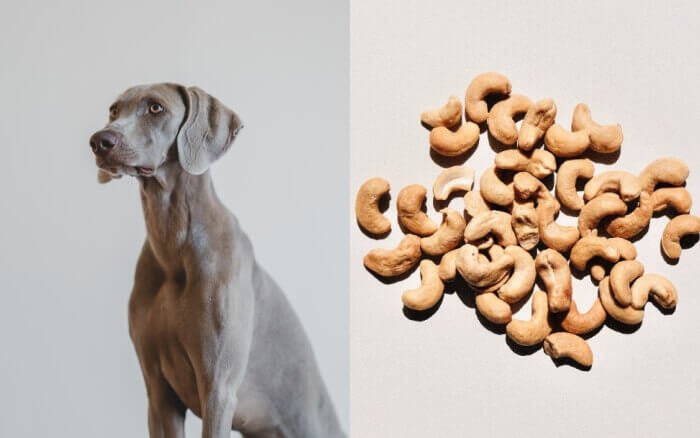When it comes to our furry friends, we always want to make sure they are safe and healthy. As responsible pet owners, we often wonder if certain human foods are safe for our dogs to consume. One such food that might cross your mind is cashews. These tasty nuts are a popular snack for humans, but can dogs eat cashews too?
In this article, we will explore whether cashews are safe for dogs, the potential benefits they may offer, the risks associated with their consumption, safe guidelines for feeding cashews to dogs, and some alternative treats that can be given to our canine companions. Let’s delve into the world of dogs and cashews to make informed decisions about our pets’ diets.
Can Dogs Eat Cashews?
Yes, dogs can eat cashews, but there are some important caveats to consider. Cashews are not toxic to dogs, but they should only be given to them in moderation. These nuts contain high levels of fats, and too much fat in a dog’s diet can lead to weight gain and other health issues.
Additionally, cashews are also high in calories, so excessive consumption may contribute to obesity in dogs. Before offering cashews to your canine companion, it is essential to understand the potential benefits and risks associated with their consumption.
Potential Benefits of Cashews for Dogs
Cashews can provide some nutritional benefits to dogs when given in moderation. These nuts are a good source of protein, which is essential for maintaining muscle mass and overall health in dogs.
Additionally, cashews contain vitamins and minerals such as magnesium, phosphorus, and zinc, which can contribute to a well-balanced diet for your furry friend. The healthy fats in cashews can also support a shiny coat and healthy skin.
However, it’s important to remember that these benefits can be obtained from other, more suitable dog-friendly foods as well.
Risks Associated with Dogs Eating Cashews
While cashews offer some nutritional value, they also come with certain risks for dogs. As mentioned earlier, cashews are high in fat and calories, which can lead to obesity if consumed excessively.
Moreover, some dogs may have allergies or sensitivities to nuts, including cashews. Allergic reactions can manifest as skin rashes, itching, vomiting, or diarrhea. If you notice any adverse reactions after giving cashews to your dog, it’s crucial to stop feeding them immediately and consult a veterinarian.
Safe Consumption Guidelines for Dogs
To ensure the safe consumption of cashews for dogs, follow these guidelines:
- Moderation is Key: Cashews should only be given as an occasional treat and not as a regular part of your dog’s diet. The appropriate serving size will depend on your dog’s size and weight, but generally, a few unsalted and plain cashews should suffice.
- No Seasonings: Avoid giving your dog cashews seasoned with salt, sugar, or any other spices. Stick to plain, raw cashews, as added seasonings can be harmful to dogs.
- Watch for Allergies: When introducing cashews to your dog, do it gradually and monitor for any signs of allergies or digestive issues. If there are any adverse reactions, stop feeding cashews immediately.
- Consult Your Veterinarian: Before adding any new food to your dog’s diet, including cashews, it’s always a good idea to consult your veterinarian for personalized advice based on your dog’s specific health needs.
Alternatives to Cashews for Dogs
If you’re looking for alternative treats for your furry friend, there are plenty of dog-safe options available. Here are some healthy alternatives to cashews:
- Peanuts: Unsalted and unsweetened peanuts can be a tasty treat for dogs, but, like cashews, they should be given in moderation.
- Carrots: Crunchy and low in calories, carrots are a great source of vitamins and fiber for dogs.
- Apples: Remove the seeds and core, and dogs can enjoy the natural sweetness and nutrients in apples.
- Blueberries: These antioxidant-rich berries can be a delicious and healthy treat for dogs.
Alternatively, there are many other types of nuts, meat, fruits, veggies, and other foods that dogs can safely consume.
Conclusion
In conclusion, dogs can eat cashews in moderation, but they are not a necessary part of their diet. While cashews do offer some nutritional benefits, it’s essential to be cautious about their high-fat and calorie content. If you decide to give your dog cashews, ensure they are plain and unsalted, and closely observe for any adverse reactions.
However, there are plenty of other dog-friendly treats available that can offer similar or better nutritional value without the risks associated with cashews. As responsible pet owners, our primary goal should always be to prioritize our dogs’ health and well-being.
Frequently Asked Questions
Can Dogs Be Allergic to Cashews?
Yes, some dogs may be allergic to cashews or other nuts. Watch for any signs of allergies if you decide to give your dog cashews.
Can Dogs Eat Cashews Without Getting Sick?
Dogs can eat plain, unsalted cashews in moderation, but excessive consumption can lead to digestive issues and weight gain.
Can Dogs Eat Cashews With Salt?
No, dogs should not consume cashews with salt or any seasonings, as it can be harmful to their health.
Can Dogs Eat Cashews Safely?
Yes, as long as they are given in moderation and without added salt or seasonings.
